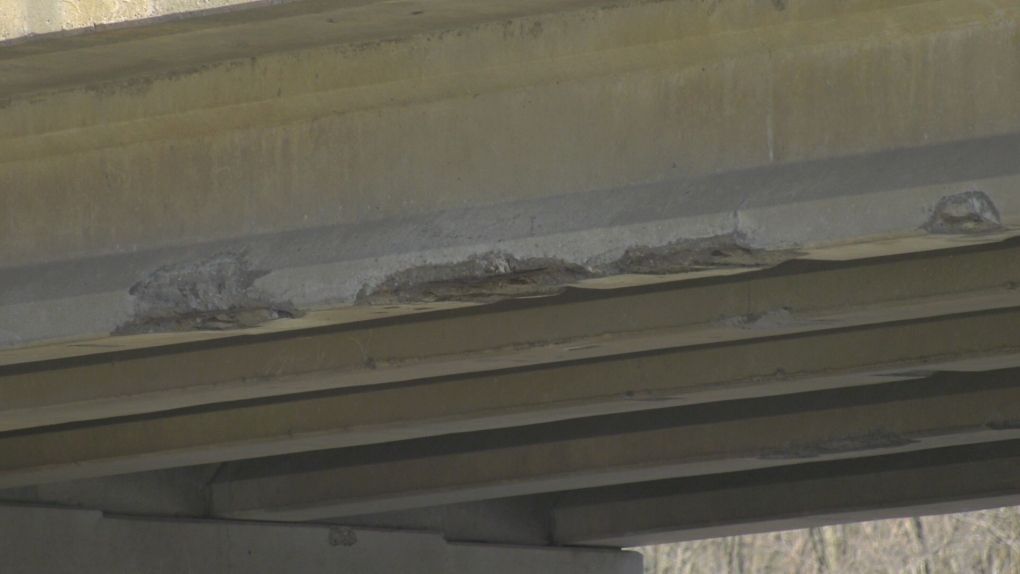April bridge project will increase emergency response times in Elizabethtown-Kitley Township
A major construction project west of Brockville will dramatically transform transportation in the area, but for hundreds of residents it will mean longer commutes, and in the case of an emergency, longer waits for help to arrive.
Starting in early April, construction crews will start the process of tearing down the Halleck's Road South overpass along Highway 401, replacing it with a new version.
Built in 1967, it was refurbished in 1974 and again in 1984, but signs of wear can be noticed when driving under it.
"There's no question that it's substandard in terms of its clearance for the 401 traffic, certainly it's age, it's at a point where it's beyond rehabilitation," said Elizabethtown-Kitley Mayor Brant Burrow.
"It really does need replacement and it makes sense to make it wide enough for the future vision of the 401 when we get to six, or heaven forbid, eight lanes," he added.
 Concrete is missing from the bottom of the bridge supports on the aging bridge over Highway 401. (Nate Vandermeer/CTV News Ottawa)
Concrete is missing from the bottom of the bridge supports on the aging bridge over Highway 401. (Nate Vandermeer/CTV News Ottawa)
It's a massive provincial project that could take up to eight months to complete, but it leaves drivers without a direct route to the southern part of the township.
It is also the main road used for emergency vehicles from Lyn Fire Station #1 to Highway 2, meaning without the bridge, some residents will now be waiting longer for help during an emergency.
"With the closure of the Halleck's Road we have to take County Road 46, or as the local residents refer to it, Lyn Road, and it's going to extend our response time by four to six minutes," said Fire Chief Andy Guilboard.
"The last couple of weeks we've been going door-to-door with crews handing out pamphlets, checking to make sure their smoke and CO detectors are functional, just explaining the delay that we could incur," he added.
"We were very concerned about the community impact," noted Burrow. "If you take a look at the road network there, that is a major, major artery for us."
In total, 441 homes will be affected by the longer response times, 11 per cent of the township.
When discussions first began about the bridge replacement, Burrow says the province didn't quite understand the impact it would have on residents.
"Gradually, over time, I was able to reach out to the premier and things started to move a lot faster and all ears were open at that point," added Burrow.
"Based on the traffic counts for Halleck's Road South going over the bridge, one month's worth of traffic on our road is the equivalent of one days worth of traffic on the 401 in one direction," he said.
"If they close down our road for a month, it would be like them closing down one side of the 401 for a day. So an eight-month project, that's like more than a week of closing half of the 401," Burrow said. "They understood they had to step up and help us with some kind of mitigation."
The fire department, which runs on volunteers, will also receive financial help from the province during construction to staff one firefighter at the station around the clock, hoping to help response times.
"They could have the trucks started, out of the hall, sitting on the tarmac ready to go for when the other members arrive and dress up," Guilboard said. "We figure it's going to knock a couple minutes easy off of the response times."
The mayor says work on another route for emergency vehicles was also completed last fall.
"If you travel on Halleck's Road West, you'll find that its surface treated from one end to the other. That now makes it a viable alternative route for our fire trucks," he said.
 Elizabethtown-Kitley Township mayor Brant Burrow, left, looks at an alternate route map with fire chief Andy Guilboard. (Nate Vandermeer/CTV News Ottawa)
Elizabethtown-Kitley Township mayor Brant Burrow, left, looks at an alternate route map with fire chief Andy Guilboard. (Nate Vandermeer/CTV News Ottawa)
While some residents are frustrated with the inconvenience, others say the largest project in the townships history is worth it.
"This is a long-term thing. It's eight months of pain for literally two or three generations worth of gain," added Burrow.
"The response has been phenomenal from the residents, they have been very thankful," said Guilboard. "Some of them have personal businesses too. That's their main route they didn't realize it was going to be down that long, so they are very happy."
"(The construction) is not going to affect us doing our jobs," he added. "What we did with the door to door campaign is to try to educate the public to be a little safer and to expect the response time from us."
Guilboard says another door-to-door campaign will begin just after construction begins, to alert seasonal residents of the longer response times.
CTVNews.ca Top Stories

B.C. tenants evicted for landlord's use after refusing large rent increase to take over neighbouring suite
Ashley Dickey and her mother rented part of the same Coquitlam duplex in three different decades under three different landlords.
Mountain guide dies after falling into a crevasse in Banff National Park
A man who fell into a crevasse while leading a backcountry ski group deep in the Canadian Rockies has died.
Expert warns of food consumption habits amid rising prices
A new survey by Dalhousie University's Agri-Food Analytics Lab asked Canadians about their food consumption habits amid rising prices.
MPP Sarah Jama asked to leave Ontario legislature for wearing keffiyeh
MPP Sarah Jama was asked to leave the Legislative Assembly of Ontario by House Speaker Ted Arnott on Thursday for wearing a keffiyeh, a garment which has been banned at Queen’s Park.
Charlie Woods, son of Tiger, shoots 81 in U.S. Open qualifier
Charlie Woods failed to advance in a U.S. Open local qualifying event Thursday, shooting a 9-over 81 at Legacy Golf & Tennis Club.
Ex-tabloid publisher testifies he scooped up possibly damaging tales to shield his old friend Trump
As Donald Trump was running for president in 2016, his old friend at the National Enquirer was scooping up potentially damaging stories about the candidate and paying out tens of thousands of dollars to keep them from the public eye.
Here's why provinces aren't following Saskatchewan's lead on the carbon tax home heating fight
After Prime Minister Justin Trudeau said the federal government would still send Canada Carbon Rebate cheques to Saskatchewan residents, despite Saskatchewan Premier Scott Moe's decision to stop collecting the carbon tax on natural gas or home heating, questions were raised about whether other provinces would follow suit. CTV News reached out across the country and here's what we found out.
Montreal actress calls Weinstein ruling 'discouraging' but not surprising
A Montreal actress, who has previously detailed incidents she had with disgraced Hollywood producer Harvey Weinstein, says a New York Court of Appeals decision overturning his 2020 rape conviction is 'discouraging' but not surprising.
Caleb Williams, Jayden Daniels and Drake Maye make it four NFL drafts with quarterbacks going 1-3
Caleb Williams is heading to the Windy City, aiming to become the franchise quarterback Chicago has sought for decades.
































